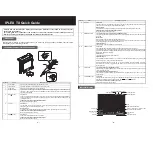
480836 V5.0 8/09
9
4-3 Using E-field sensor
The 3-channel sensor is located at the top of the meter. The three voltages generated
by the sensor are fed back to the meter. In far-fields, an E-field sensor is preferable due
to the greater bandwidth. The E-field sensor frequency ranges from
50MHz to 3.5GHz
(calibration accuracy only supports measurements in the 900MHz, 1800MHz, and
2.7GHz ranges, other measurements made in the 50MHz to 3.5GHz range are for
reference purposes only).
The meter is a small portable instrument that measures the electric field in the atmosphere of
the sensor’s surroundings. The measurement of the field is done by moving the aerial of the
sensor in the desired measured environment.
A direct wide band measurement is obtained of the field that the measurement sensor is
subjected to. To find the value of the field emitted by a source of interference, simply
point the aerial towards it and get as close as possible (the value of the field is inversely
proportional to the distance of the sensor/emission source). The operator must take care
not to be between the source of disturbance and the zone to be checked. The human
body shields electromagnetic fields. The E-field sensor is isotropic; it does not require
special handling. It measures the field according to 3 axes without the aerial having to
be moved in the 3 planes. Simply point it at the target to make the measurement.
4-4 Explanatory notes
4-4-1 Units of measurement
The meter measures the electrical component of the field; the default units are those of
electrical field strength (mV/m, V/m). The meter converts the measurement values to the
other units of measurement, i.e. the corresponding magnetic field strength units (
μ
A/m,
mA/m) and power density units (
μ
W/m
2
, mW/m
2
, W/m
2
,
μ
W/cm
2
or mW/cm
2
) using the
standard far-field formulate for electromagnetic radiation.
The conversion is invalid for near-field measurements, as there is no generally valid
relationship between electrical and magnetic field strength in this situation. Always
use the default units of the sensor when making near-field measurements.
4-4-2 Result modes
The bar graph display always shows each axis (X, Y or Z) the instantaneous
measured dynamic range value. The digit display shows the measurement
according to one of four selectable modes:
•
Instantaneous
: The display shows the last value measured by the sensor, no
symbol is displayed.
•
Maximum instantaneous (MAX)
: The digital display shows the highest
instantaneous value measured, the “MAX” symbol is displayed.
•
Average (AVG)
: The digital display shows the average value measured, the “AVG”
symbol is displayed.
•
Maximum average (MAX AVG)
: The digital display shows the highest average
value measured, the “MAX AVG” symbol is displayed.
t
Max. Hold
Average
Actual
Max. Average
Field strength




































